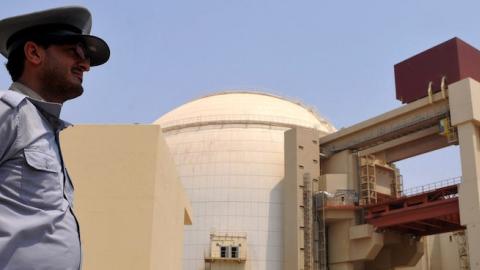Last Sunday, Iran and the P5+1 countries (the U.S., U.K., France, China, Russia, and Germany) formally adopted the new nuclear agreement concluded this summer. In coming days, under the terms of the deal, formally known as the Joint Comprehensive Plan of Action (JCPOA), the Islamic Republic is obliged to begin implementing a series of curbs on its nuclear program.
There is good reason to believe that it will do so in the near term, because the scope of the sanctions relief contained within the JCPOA is enormous - equivalent to a quarter of Iran’s total economy. As such, complying with the terms of the deal makes good economic sense for Iran’s ayatollahs, at least for the moment.
That, however, does not signal an end to America’s Iran problem. To the contrary, the entry into force of the JCPOA ushers in a new - and even more challenging - phase of American policy in the Middle East.
Already, the nuclear agreement has begun to empower a range of destructive Iranian behavior. In recent weeks, the Islamic Republic has initiated major new procurement talks with arms suppliers such as Russia and China, conducted a high-profile ballistic-missile test in violation of U.N. Security Council resolutions, and significantly expanded its military footprint in Syria. This adventurism, moreover, is poised to become more pronounced in the weeks and months ahead, as the economic benefits of the nuclear deal begin to kick in in earnest.
Given the foregoing, U.S. policymakers need to begin thinking about the vulnerabilities that are likely to result from the agreement with Iran, as well as steps they can take in order to mitigate them. These fall into four broad categories:
Compliance: The particulars of the JCPOA confirm that the initial objective of Western diplomacy with Iran - the “rollback” of the Islamic Republic’s nuclear infrastructure - has not been attained. To the contrary, the terms of the agreement will actually help Iran develop a stronger nuclear program over time. The United States therefore needs to develop and deploy advanced forensic and scientific technologies to accurately track Iran’s nuclear-related activities to make sure Iran remains within the parameters of the JCPOA - as well as to publicly outline a menu of “scalable responses” by which to punish the Islamic Republic if it doesn’t.
Economic Warfare: In Iran today, the clerical army, the Islamic Revolutionary Guard Corps (IRGC), is second only to the Supreme Leader in strategic importance. It is nothing short of an economic powerhouse, in control of as much as one-third of Iran’s entire economy. As a result, the IRGC will inevitably be among the biggest beneficiaries of the enormous sanctions relief given by the JCPOA, and its threat potential will expand accordingly. Limiting the IRGC’s destructive capacity requires restricting its access to the international economy — by formally designating the entire IRGC as a terrorist entity, and then comprehensively mapping and identifying its constituent entities, economic interests, and affiliated companies in order to prevent Iran’s foreign partners from trading with them.
Defense: The Obama administration has articulated its commitment to deterring Iran from obtaining a nuclear weapon, and has said it would use military force if necessary. Yet the administration so far has not taken concrete steps to convince the Iranian regime that it is prepared to do so. This would require an unambiguous deterrence posture making clear America’s readiness to use resolute force to prevent Iran’s acquisition of the bomb, either during the lifespan of the JCPOA or afterwards. By necessity, it also means a recapitalization of American defense capabilities, so that the U.S. can credibly assure the protection of allies in the event of hostilities with Iran, or undertake unilateral military action against the Islamic Republic in the event of material breach of the JCPOA or some other casus belli.
Iranian Democracy: Already ranked among the world’s most repressive regimes, Iran over the past several years has engaged in a deepening crackdown on human rights, freedom of expression, and political choice. This trajectory should be of significant concern to American policymakers, because Iran’s population of nearly 82 million is overwhelmingly youthful, educated, and Westward-looking. This “other” Iran holds out the promise of a more durable and harmonious relationship with the West. But the JCPOA imperils Iran’s democratic potential, because it strengthens the current Iranian government at the expense of its captive population, even as it downgrades Western concerns over Iran’s political trajectory. In response, Congress needs to act more resolutely than ever before, through both public statements and concrete legislation, to shine a spotlight on Iran’s human-rights abuses and to penalize the Iranian government for its repression of democracy at home.
All of these steps are necessary because, while a nuclear deal has now been struck, the broader strategic challenge that Iran poses to American interests and allies persists. Resolute action is necessary to prevent Iranian cheating while the JCPOA is in force, an Iranian nuclear breakout thereafter, and adverse effects stemming from Iran’s acquisition of the extensive sanctions relief in the meantime.
Currently, the United States lacks both the capacity and the credibility to respond to the potential consequences of the nuclear agreement. Altering this state of affairs must become a priority for U.S. lawmakers in the months and years ahead.
All authors are members of a recent AFPC Task Force on the consequences of the Iran deal. The Task Force’s full report can be found at here.




















